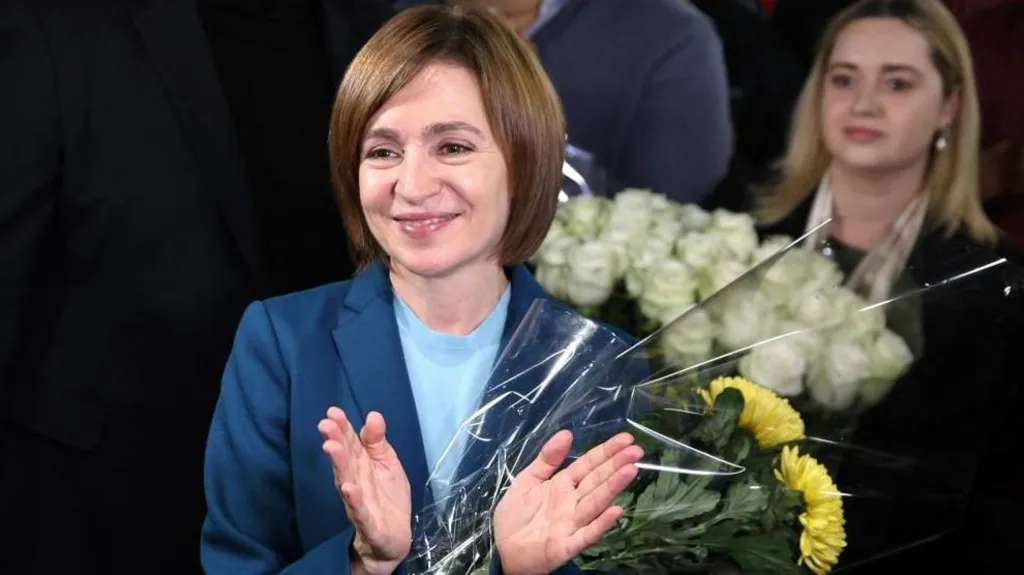
In a highly contested election run-off, Moldova’s pro-European President Maia Sandu has successfully claimed a second term, with the outcome representing a critical decision for the country’s future—between alignment with Europe and closer ties to Russia. The Central Electoral Commission of Moldova confirmed Sandu’s victory early Monday, marking a significant moment in the region’s political landscape.
With the majority of votes counted, Sandu emerged victorious, securing approximately 55% of the vote. In a late-night address on Sunday, she expressed her commitment to being a president for all Moldovans, highlighting her desire for unity in the face of division.
Her main opponent, Alexandr Stoianoglo, supported by the pro-Russian Party of Socialists, advocated for a stronger relationship with Moscow. The election process, however, was marred by claims of extensive Russian interference, with Sandu’s national security adviser alleging that such meddling had “massive potential” to distort the electoral outcome. Russia has denied these allegations, despite a broader context of geopolitical tension in Eastern Europe, particularly following recent elections in Georgia, where similar claims were made regarding Russian influence.
Stoianoglo, previously dismissed from his role as prosecutor general by Sandu, has denied being pro-Kremlin. Nonetheless, the European Commission and top EU diplomat Josep Borrell issued a joint statement congratulating Sandu on her re-election while emphasizing the unprecedented nature of Russia’s interference in the electoral process.
As polling concluded, both candidates addressed their supporters. Sandu, who has a significant following among expatriates, particularly excelled in urban areas and among younger voters. In contrast, Stoianoglo found more support in rural regions. Turnout was notably high at 54%, especially among voters abroad, demonstrating the engagement of the Moldovan diaspora.
Despite Stoianoglo initially leading on election night, Sandu’s late surge drew cheers from her campaign headquarters, with supporters chanting “victory.” In her speech, she acknowledged the electorate’s desire for democracy and unity, stating, “I have heard your voice – both those who supported me and those who voted for Mr. Stoianoglo. In our choice for a dignified future, no one lost… we need to stand united.”
Olga Rosca, Sandu’s foreign policy adviser, expressed pride in the election result, emphasizing the need to view votes from domestic and expatriate Moldovans as part of one family. Rosca noted that the president’s commitment to combating corruption and advancing judicial reforms would continue, reflecting the electorate’s call for change.
The final election results are expected to be formally announced on Monday. Ursula von der Leyen, President of the European Commission, praised Sandu’s resilience in overcoming electoral challenges, reaffirming her commitment to working towards a European future for Moldova.
Stoianoglo, after casting his vote, characterized himself as an “apolitical president,” suggesting that Moldova could thrive through a balanced approach to both Western and Eastern partnerships. He performed well in southern rural areas, while Sandu dominated in urban centers.
During the election, accusations arose regarding organized efforts by Russia to transport voters to polling stations, raising concerns over the integrity of the process. Reports indicated bomb scares in multiple locations, including polling sites in the UK and Germany, further complicating the election landscape.
Moldova, a former Soviet republic bordered by Romania and Ukraine, faces ongoing challenges as one of Europe’s poorest countries, with a population of approximately 2.5 million. A significant expatriate community of around 1.2 million adds another layer to the electoral dynamics.
Concerns have been raised about the involvement of Ilan Shor, a fugitive oligarch based in Moscow, who allegedly spent millions to influence the election in favor of pro-Russian candidates. Shor’s promises of cash incentives for voters have drawn criticism, as many fear that such tactics could undermine Moldova’s democratic processes.
Political analysts have cautioned that a Stoianoglo victory could drastically reshape Moldova’s political alliances, as Russian backing for his campaign indicates a strategic move in the region. Voter turnout included significant numbers from Transnistria, a breakaway region with a Russian military presence, raising further questions about electoral integrity.
While Sandu won the first round of voting convincingly, the second round was characterized by last-minute shifts in voter allegiances and heightened political tensions, culminating in a referendum that narrowly favored constitutional changes to strengthen ties with the EU. Despite challenges ahead, Sandu’s re-election signifies a continued commitment to European integration and democratic values in Moldova.





